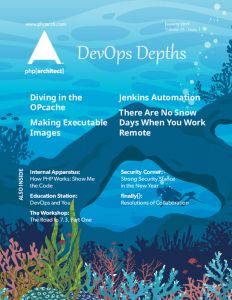When you want to guarantee code quality, do continuous deployments, or any other automation you need a robust continuous integration server. While there are many great (hosted) solutions like Travis CI, CircleCI, and others, when it comes to full control or the need for private hosting, Jenkins is the perfect candidate. Jenkins has a reputation as difficult to learn and to configure, but with their latest pipelines and some easy scripting, managing Jenkins has never been more fun.
Once a mere HTML forms processor, PHP has dramatically evolved into a capable, mature programming language. But it was never tailored to support the distribution of a program in a non-source code package. In this article, we study some of the engine’s internal mechanisms and consider a few observations with the OPcache extension to propose a simple modification which could open the way to the deployment of pre-compiled PHP programs.
For most web developers, images are always static files. For PHP programmers, this doesn’t need to be the case. Executable images, created on-demand, can perform any programming task as well as functioning as standard images.
Do you think you have what it takes to work remote? Better yet, does your company or the place you’re interviewing with have what it takes to support remote workers? Consider this your guide to deciding if you’re in the right place to start working remote, and if you are—how to survive this substantial work-style change and implement rules, patterns, and boundaries to help you be successful.
Last month as I was writing “The Workshop: Producing Packages (Part Three)” I had a feeling I would regret the line “This will be the third and final installment in this series.” Sure enough, I have one more topic I want to cover: upgrading to a new PHP version.
January is a month all about setting resolutions for the new year. A new diet. A new budget. A new FOSS contribution goal. In 2019, let’s intentionally focus on keeping our projects safe and taking a strong stance on security.
We all use PHP; it’s open source, which means anyone can take a look. However, it’s not as easy as with the various PHP frameworks, because PHP is written in C and makes heavy use of C preprocessor macros. We’ll see it’s relatively readable once we know how and where to look.
The tech industry is always awash with new ideas that are actually old. One which gained traction in the last ten years is the idea of “DevOps.” This term is the combination of “Development” and “Operations” and is meant to show these two roles can be combined for more efficiency.
I’m taking a break in my series of topics on the Seven Deadly Sins of Programming to talk about a positive aspect instead of a negative. The topic of collaboration is an important one to all open source projects in general. I’d love to see the PHP community wholeheartedly embrace it and make a new year’s resolution to collaborate more.






Leave a comment
Use the form below to leave a comment: